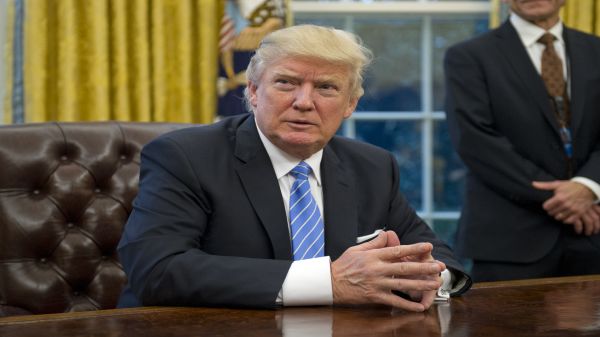
President Donald Trump put Amazon, eBay and Alibaba and other online marketplaces on notice Wednesday, signing a memorandum that aims to curb the sale of counterfeit items online.
“This is a shot across the bow to those companies. If you don’t clean it up, then the government will,” Trump trade advisor Peter Navarro told reporters.
The effort comes as major online marketplaces have struggled to control the sale of fake products from third-party vendors.
Navarro said the White House will aim to gather more data on how widespread the problem is and who is to blame.
The administration will require a report within 210 days from the Departments of Homeland Security, Commerce and Justice, according to the memorandum. It will analyze how widespread the problem is and how effective current responses are, while recommending potential regulatory or legislative changes to better combat the sale of fake goods.
In a Wall Street Journal op-ed Wednesday, Navarro said Trump’s measure “instructs the Department of Homeland Security to coordinate with federal law-enforcement agencies working to combat counterfeiting.” While Navarro did not give many specific details about how the White House would address the counterfeit problem, the memorandum serves as a warning to e-commerce companies.
In justifying the action, Navarro in part cited a 2018 Government Accountability Office report showing widespread issues with counterfeiting. The agency’s investigators purchased brand name products from third-party vendors on sites such as Amazon, Walmart.com, Sears, Newegg.com and eBay and found 40 percent of the goods were fake.
Those include products such as medicines and batteries, which could pose risks for consumers.
“Our goal is to rightly shift the burden of trafficking to the supply chain and third party online marketplaces and intermediaries that right now are blanketing this country with dangerous products that cheat consumers out of billions of dollars a year,” Navarro said.
In a statement, an Amazon spokesperson said the company “strictly prohibits the sale of counterfeit products” and welcomes “additional coordinated support from law enforcement so we can hold bad actors accountable.”
Amazon “invests heavily in proactive measures to prevent counterfeit goods from ever reaching our stores,” the spokesperson said. “Bad actors that attempt to abuse our store do not reflect the flourishing community of honest entrepreneurs that make up the vast majority of our seller community.”
In a statement, an Alibaba spokesperson said “we welcome this new initiative and the attention it brings to the global fight against counterfeiting.” The company has “developed best-in-class systems to protect [intellectual property] and battle the scourge of counterfeiting,” and looks forward to “further advancing the working relationship and cooperation with the US federal agencies mentioned in today’s order, as well as with our global commerce peers,” the spokesperson added.
In his op-ed, Navarro said the problem has grown in part “because customs law has not kept up with the surge of e-commerce.” The trade advisor pointed in part to problems with shipments from Hong Kong and mainland China — which is significant because he has called for a tougher posture on trade with China as the administration tries to strike a new trade deal with the world’s second largest economy.
Navarro denied that the memorandum had anything to do with the ongoing trade talks between the U.S. and China, where another of the world’s biggest third party sellers, Alibaba, is based.
“This has nothing to do with that,” he said.
Navarro also denied that the measure, which targets Amazon, was in any way connected to Trump’s oft-stated disdain for Amazon CEO Jeff Bezos, who also owns The Washington Post, an outlet that has reported extensively on Trump’s overseas businesses and the Mueller probe.
Nonetheless, both subtexts were difficult to overlook, given the timing of the memorandum and the disproportionate impact that any enforcement action would have on Amazon and Alibaba.
BY CNBC NEWS
